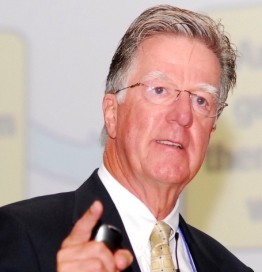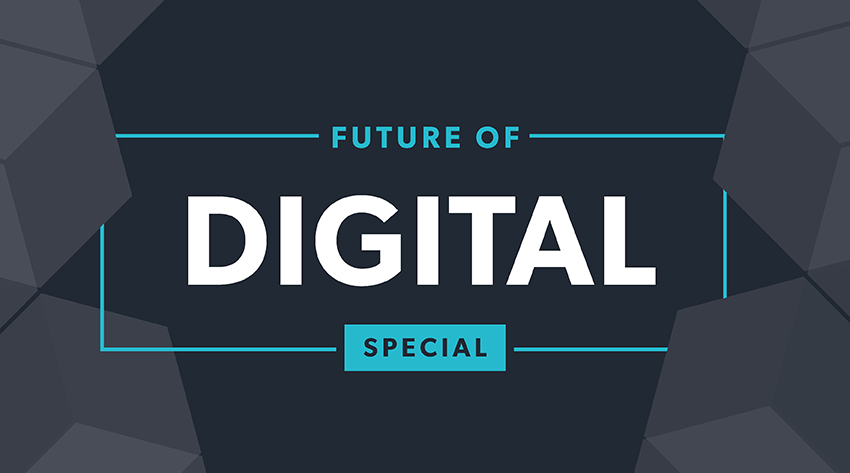This post is the second part in a two-part special on the blog this week as part of our Future of Digital focus. Below we share the best of breed ideas from the Thinking Digital Conference, while part one focuses on where web design is heading next...
Team Zazzle spent two enlightening days sharing ideas on the future of digital at the annual Thinking Digital Conference this week and captured the best bits to keep you ahead of the curve.
As part of our internal commitment to drive innovation and stay at the cutting edge of digital content we sent a team to the event in Newcastle to listen to some of the brightest minds in the industry share their visions for the next decade and beyond.
Below is our edit of the very best views and opinions, so grab a coffee and spend a few minutes imagining where we are heading next...
Bill Jinks - IBM CTO for UK Sales & Distribution
- Discussed IBM sponsorship with Wimbledon

- Long term sponsorship partner (27 years) – like a marriage – evolve & listen to each other. Share common goals, vision & values
- In raising profile of Wimbledon, don't restrict your communications, use every single avenue & platform & use them all to full capabilities.
- Unexpected platform works best for Wimbledon – desktop. Viewers are in office hours plus widescreen experience this platform gives enables additional editorial content.
- Imagery & video are key for this partnership.
- Must never have a one size fits all approach.
- Challenge now is to Get inside social media and create brand advocates.
- IBM created online social command centre which creates buzz and drives traffic back to Wimbledon.com
- Command centre staffed by editorial teams – they analyse trends and capture influencers and the target data led content onto them.
- Focus during tournament is on real time data driven content.
- Analysts court-side who provide data are all tennis players who can translate data into stats and send to command centre. IBM recognised quickly it was easier to train tennis players to learn data than analysts to learn tennis.
- Experts in field key for best content.
- Stats & data from this go out to media 1st again always in real time
- Command centre excellent best practise for all live events (sports / ents /arts) & ensure how media are notified in best way possible.
- Data key for creative content
IRINI PAPADIMITRIOUS - Digital programme manager at V&A
 Expanded and drew on her talk from the 1st Focus on collaboration
Expanded and drew on her talk from the 1st Focus on collaboration- Discussed need for innovation in how we bring people together in order to ensure better creativity.
- Discussed how she develops partnerships by looking real-time 'at the moment' – what are people talking about socially & culturally.
- Listening is the most important tool for collaboration
- 'Is it possible to NOT work collaboratively'
- looked at how tech / digital innovations can facilitate 'dry' parts of museum life such as finance / gifting.
- Used wearable devices to encourage giving /donations.
- Collaboration needs to be an open process & use technology to enable this
MIKKO HYPPONEN - Chief Research Officer of F-Secure
- Hunts hackers for a living

- We have to understand our cyber enemy if we stand a chance of securing out networks
- What is our enemy's motivation – criminal /spying / war & conflict
- Complexity of systems is the enemy of security
- Big complex sites are never safe. Every Fortune 500 company is being hacked right now as their systems are too complex & it is impossible to defend every single corner so breaches will happen
- Companies must build resilience into systems.
- Whilst security is slowly getting better companies are still running into the same problems again and again.
- Ransom Trojans never going away- Eastern Europe origin predominantly.
- Only way to avoid is to NEVER CLICK ON THE ENABLE CONTENT BUTTON
- 300million Euros last year were tracked through known ransom Trojans. Wealthy criminals.
- Lack of social opportunities to progress drives Eastern European hackers = easy money to be made.
- Going forward re cyber security.... Extremists hard to predict damage they will do – feels like we are entering into a cyber arms race.
JOHN THORP - Internally recognised thought leader in field of value & benefits management.
 John's passion revolves around helping individuals, organisations & society realise the value of information technology enabled change.
John's passion revolves around helping individuals, organisations & society realise the value of information technology enabled change.- This goes beyond frameworks & methodologies – it requires fundamental mindset shift around organizational leadership.
- Businesses need to realise their value in a digital world.
- If we continue to do the same thing (in both private & public sectors) we will never evolve from industrial age. Digital forcing us to evolve & change.
- We are increasingly embedded into technology so we must use it to create communities of value.
- Need to change mindset & behaviour around technology & embrace digital
- Industrial governance in a digital world will not work. We need to be flexible to the flow of this new landscape.
- Leadership is key – embrace people not command and control of old.
- Digital processes free people to do what they do well and give confidence to challenge the status quo.
ED HIPKINS - Drummer
 Technology innovation in music
Technology innovation in music- Listening to The Prodigy made him want to play dance music on his drums. This was impossible!
- Discussed & challenged us with the concept that you can (& indeed it is good too) innovate through your limitations
- Through manipulative of digital technology, audio and sampling he got the drums to eventually play dance music
- What excited him throughout this lengthy process / evolution was that limitations as a player gave him a spark of finding creativity to set him free.
JAMES MURRAY - Search Advertising Lead for Microsoft UK & evangelist for BING search platform
 He / Bing /Microsoft setting out to change the future of search engines.
He / Bing /Microsoft setting out to change the future of search engines.- Google dominant & rich but history is on their side – no empire lasts forever.
- 'Just owning the verb isn't enough. Bing has the opportunity to be the Dyson of search'
- To do this focus on decoding human context
- We need to give right & crucially relevant info to the search engine
- To do this you require contextual search. For example just putting in Paris Hilton – what do you want?? The French hotel or American socialite?
- Search engines need to be intelligent enough to know / predict what you need and understand the context and situation you are in.
- Also looking at the use of facial recognition in this – emotions give clues – pupils dilating
- Environmental context also key – such as knowing what the weather is and giving appropriate response to match that i.e. closest coffee house when it is raining rather than giving you your favourite chain of coffee house.
- James really rates Disney in understanding social / external contexts.
- Tone of spoken language is key in search engines – tone can completely alter what you mean to say.
- Skype Translator – ground braking in taking this forward & a key marker for the future.
- Through Skype Translator you can talk to someone in a completely different language without error in words context or tone.
- To him & Microsoft next evolution of search is CONTEXT
JOE FAITH - Product Manager at Google
 Google least process driven company in the world
Google least process driven company in the world- Culture built on principles and values which is an enabling innovative lead culture
- Three core values that go into Google NPD are:
- 1 – FOCUS ON THE USER
- Shallow meaning – customers love & use product
- Deeper meaning – focus firmly on adoption then monetisation will follow
- Best example of this is Android.
- Google doesn't make money direct from Android – it comes from Playstore – but that happened after Android was launched & adopted.
- 2 – WHAT IS 10X
- Question asked by Google when presented with products to fund.
- Means- 10 times better for the user – faster, cheaper, lighter etc.
- 3 – LAUNCH & ITERATE
- key to produce an early version to get all issues & faults out of the way
- 'If things don't break you will have waited to long to launch' philosophy
- Google examples – G Doc & Chrome Web Browser
- Everything has to pass the 'dog food' test. Staff have to try out products / eat your own dog food!
See part one of our Future of Digital Special by clicking on the button below.
Sign up for our monthly newsletter and follow us on social media for the latest news.





 Proudly part of IPG Mediabrands
Proudly part of IPG Mediabrands